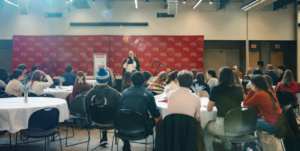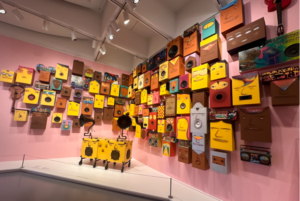Woman in Science Profile: Nancy Adleman Ph. D.
By Angelica Sisson
Nancy Adleman, Ph.D. is an advisor for the Neuroscience minor and an Asisstant Professor in the Department of Psychology at the Catholic University of America. Adleman graduated with a Bachelors of Arts in Psychology with a concentration in Neuroscience from Stanford University in 1999. She continued her academic career at Stanford’s University School of Medicine, graduating with a Ph.D. in Neuroscience in 2008.
“I wanted to be at a school where I could both work closely with students and conduct my research,” Adleman said when asked why she chose Catholic University. “CUA is one of the few places that offers the community feel of a small college while valuing research like a large university—it has the best of both worlds!”
Adleman went on to say that the people she had met at Catholic University were another main factor for choosing this school.
Adleman’s research is focused on mental health disorders in children and adolescents. Specifically, she uses a series of brain imaging techniques called neuroimaging to track the similarities between mood and behavioral disorders.
“I was drawn to neuroimaging because I am fascinated by the brain and how it works, but I was particularly drawn to conducting research with direct applications to improving people’s lives,” Adleman said. “Mood and behavioral disorders induce a great deal of suffering. The presence of these disorders during childhood may additionally interfere with attainment of developmental milestones, leading to a poorer lifetime outcome for the child. If we can identify the differences in the brain associated with mental illness, this may aid in determining the appropriate course of treatment for individual patients, preventing disease exacerbation, speeding symptom relief, and improving quality of life.”
Adleman is perhaps best well-known amongst undergraduates in the Department of Psychology due to her part in the creation of the interdisciplinary neuroscience minor. Sahanna Kukke, Ph.D., an Assistant Professor in Biomedical Engineering at Catholic University, also with a background in neuroscience, joined Adleman in this project. The two colleagues came together to foster the opportunity for students to explore their interests in neuroscience.
“One of the strengths of neuroscience is that it is an interdisciplinary field in which scientists approach big problems from different, complementary angles,” Adleman said. “We wanted to promote this interdisciplinary model with neuroscience at CUA. The neuroscience minor, by virtue of being an interdisciplinary minor, provides students from different majors the opportunity to take classes together. It also lets students with different interests in neuroscience develop these interests. We’re very excited to watch it grow!”
As a distinguished woman in a scientific field, Adleman had a big part in Women’s History Month, which was the month of March. Much of the news during this month revolved around the empowerment of women and the tendency for women to be underrepresented in Science, Technology, Engineering, and Mathematical (STEM) fields.
“I think one of the first things that can be done to encourage women in STEM is to publicize the work and successes of these women. This will help to alter implicit attitudes and provide role models for other women,” Adleman said.
She went on to mention Catholic University’s new initiative for women in STEM.
“One way in which CUA is already working to promote its own women in STEM is through the CUA Women in Science monthly series at Busboys & Poets hosted by the School of Arts & Sciences. The events are educational and a lot of fun – I encourage everyone to attend!”
When asked to choose a woman in science who was most inspirational to her, Adleman found it very difficult to decide, since there are so many.
“[Rita Levi-Montalcini] is an amazing woman scientist – she won the Nobel Prize for seminal neurobiological research she conducted in the 1930s and 40s. As an example of a more recent woman scientist, I am inspired by Helen Mayberg. She does incredible work in understanding the brain abnormalities that characterize depression and she spearheaded deep brain stimulation treatment for treatment refractory depression.”
For anyone considering graduate work in neuroscience or a related field the best thing to do is gain research experience Adleman said, “there really is no better way to know whether graduate school is the right path for you than to do research. Plus, it will really strengthen your application.”








